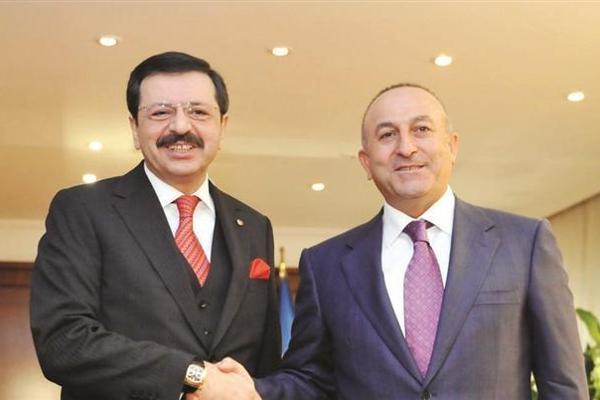Turkey releases its own EU Progress Report
ANKARA


EU Minister Çavuşoğlu (R) hosts TOBB chief Hisarcıklıoğlu in Ankara. AA Photo
Turkey’s European Union Ministry has issued its second progress report concerning the country’s EU membership bid.The report presents the Turkish government’s determination on the reform process and “one of the most important documents that outlines concrete examples of work done in every field,” newly appointed EU Minister Mevlüt Çavuşoğlu said in a statement.
“The Progress Report by Turkey should not be perceived as a reaction to the European Commission’s 2013 Progress Report on Turkey. Our objective is to inform the public about Turkey’s resolutely-continuing reforms in the most comprehensive and objective manner and to underline the accession process brings about significant achievements, despite the difficulties encountered,” said the minister.
The European Union released its progress report on Turkey Oct. 16, with the anti-government Gezi protests in June putting a mark on crucial parts of the document, including democracy and the rule of law, financial services and the media. The report also highlighted a number of important steps taken by Turkey over the past 12 months, notably the adoption of the fourth judicial reform package and the peace process to end militancy and violence in the southeast of the country.
The administrative arrangements provided for in the Democratization Package have been realized without delay, said the report issued by the EU Ministry. The government presented the democratization package on Sept. 30, 2013.
“In this framework, the restriction on headscarves in public institutions and organizations has been lifted and the student oath, which was ended in secondary schools, has also been abandoned in primary schools,” the report stated.
The work on the protection of personal data and the establishment of the Anti-discrimination and Equality Board, which are also included in the Package, is currently underway in the form of separate laws, according to the report.
The most important arrangement in the area of civil-military relations is that the expression “the duty of the Armed Forces is to look out for and protect the Turkish homeland and the Turkish Republic established by the Constitution” was changed as “the duty of the Armed Forces is to protect the Turkish homeland against external threats and dangers,” in Article 35 of the Internal Service Law of the Turkish Armed Forces, said the report.
